Dungeons & Dragons just had both its 50th anniversary and its next edition release—wait, hold on, I'm getting a message on my Sending Stone—it's not actually an edition, it's a "revamp". Instead of doing like Wizards of the Coast typically does, and reinventing the wheel, its best team of rules lawyers has instead drafted up a 2.0 of sorts. 'D&D 5e the Sequel', now with flames painted on the side.
This is unusual. Typically, a new edition comes along every five to 12 years. Third edition came out in the year 2000 (though 3.5 was 2003), fourth edition came out in 2008, fifth edition came out in 2014—this'll mark the first time D&D hasn't had a major rules overhaul in a similar timeframe. All this to say, we were overdue a reinvention, and if forecasts continue on their current trajectory, it'll be another few years before Wizards of the Coast even considers it.
So, what does the future of D&D look like for the next five to 10 years? Well, over my Christmas break, I was actually visited by the ghosts of D&D past, present, and future to be told the true meaning of tabletop. Only, as I stood there in my nightgown and big floppy hat and holding a comically-sized candlestick, I realised there was a lot of umming and ahhing. Because D&D's in a weird spot.
The Past: It's been one hell of a decade
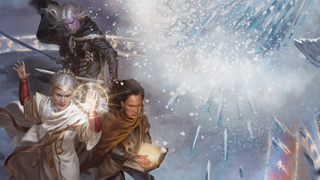
Wizards of the Coast has been flying high these past 10 years. While D&D’s inclusion in Stranger Things did absolutely push it into the public consciousness, I'd credit Critical Role—and the flood of very good actual play shows and podcasts that sprung up around it, like Dimension 20, NaddPod, The Adventure Zone, High Rollers, and so on—for the hobby's sudden and dramatic boost in popularity.
Fourth edition, while I did have a good bit of fun with it, received a lot of criticism for being too 'videogamey'. But when fifth edition came out to fix those issues, Critical Role and its contemporaries were hot on its heels as basically perfect advertising for the whole endeavour. Lightning struck the bottle for Wizards of the Coast, and stayed there for a decade.
That's not to say D&D hasn't had its controversies during that time. The Open Game License debacle, a story broken by D&D sleuth Linda Codega for Gizmodo, nearly sank the whole bloody thing. To put it simply, Wizards wanted to muscle in on its prior licensing, forcing companies making a certain amount to pay royalties and, more importantly, summoning an executioner's axe over any third-party products papa WotC didn't like, compromising creative control and allowing the company to revoke their licence retroactively. It was a breathtaking act of hubris.
Mercifully, the outrage was so loud that the company backed the hell off but, make no mistake, it sure tried. There've also been AI scandals aplenty, and that one time WoTC, uh, hired the Pinkertons to go after someone with accidental early access Magic: The Gathering cards.
I suppose that's what has defined an otherwise incredible decade for Wizards: A bounty of gold that it's been scrambling to pick up off the floor, like a feral Scrooge McDuck. Hasbro and Wizards have been trying to capitalise voraciously, not just with the OGL attempt, but with a movie (that was pretty decent, all told), Baldur's Gate 3 (which was extraordinary, even more told) and a horde of other licensing deals for videogames. Plus its own Virtual Tabletop, which doesn't get to eliminate its competitors via OGL shenanigans anymore, yippee.
The 2024 rules revamp, then, marks a final thrust at setting D&D, and Wizards, up for another decade of success. It struck gold, and so it's invested heavily in making 'Gold: The Sequel' taste just like the original recipe, so that it may continue to persist in its eternal cultural zeitgeist and make a bajillion moneys. But was that the right call?
The Present: It's just like the past, but better
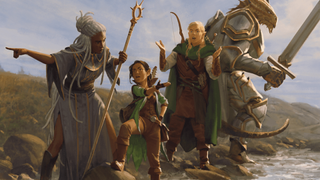
I've been very cynical about Wizards of the Coast's big stinkers over the past 10 years—and with good reason, I mean, the Pinkertons? Seriously?—but I do want to say that I'm largely positive on the work that's been done with the 2024 revamp, and it's not even technically complete.
For context, the 2024 rules revamp has resulted in updates to the Player's Handbook and the Dungeon Master's Guide both. These are, pretty conclusively, the most important parts of it, seeing as the revamp is backwards-combatable with the 2014 edition, so you can just keep using those monsters until February. The books we have now are the majority of the important rules that tell us what D&D 2024 is actually like.
One must give due credit to the coat of paint: It is fresh. Weapon Mastery properties for martial characters—your fighters, rogues, and barbarians—are the big draw here, finally giving them something to do on their turn besides attack a couple times. Otherwise, classes have been revamped and retooled in a way that's tightened the loose bolts. Blade Ward is even semi-decent, now! It only took 'em 10 years.
The Dungeon Master's Guide is also a big upgrade, going from 2014's basically useless hunk of paper to a pretty good, if basic, instruction book on how to run, build, and craft ideas for a campaign. I think they could've done more, because I'm a big old grump, but the whole exercise of the rules revamp has achieved most of its stated goals.
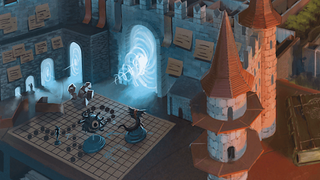
Things are looking a bit weird with Hasbro at the helm, though. Sweeping layoffs hit the D&D team hard, including a lot of people responsible for Wizard's most sensible move of the past 10 years, Baldur's Gate 3. Speaking of, Larian's moving on to other things, leaving Hasbro scrambling to find a developer who can make Baldur's Gate 4—and let's be honest, no one does it like Larian, right now.
Then there's Critical Role, which has grown so thoroughly big in its boots that it's made two TTRPG systems of its own, Candela Obscura and Daggerheart, plus its own current animated series and upcoming videogame. Not to mention, the live campaign's starting to close out its third season, standing at over 338 episodes total—and, jeez, I wouldn't be shocked if Matt Mercer & Co. want to maybe play something else for a bit. If their average session length is four hours, then that's 1,352 hours in the same system. D&D might be about to lose its most visible champions, for a while at least.
The problem, as it stands right now, is one as old as the concept of the shareholder itself: The line must go up."
Other actual play staples are getting all polyamorous with their systems, too. While Dimension 20's Brennan Lee Mulligan is so attached to D&D he tried to argue it wasn't a combat-focused system (if there's any chance he's reading this—hi and I'm very sorry, I adore your work, just not that take), Dropout's flagship TTRPG show has been mucking around with other systems for its seasons Misfits & Magic and Never Stop Blowing Up.
The problem, as it stands right now, is one as old as the concept of the shareholder itself: The line must go up—Hasbro and Wizards both have obligations to keep building their Tower of Babel ever higher, because just doing a good job isn't enough anymore. You've gotta show you've grown. I get this eerie feeling that we're now at the limit of D&D’s sensible expansion, and are about to round the corner on some more interesting times.
The Future: Where do we go now
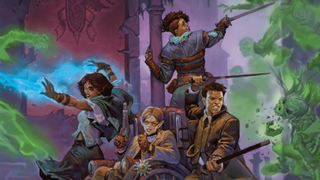
While A Christmas Carol's future ghost has a pretty solid idea of how things are going to go, I think mine's a little broken. Its head kept whirring around and it was speaking in tongues and portending doom—something about the sun exploding in 2029? I'm sure it's fine.
In all seriousness, the way I'd best describe D&D's current position is a leap to the next roof over, captured in slow motion. It's Toby Maguire, discovering his spider powers for the first time, legs cartwheeling through dead space over the befuddled citizens of New York. Before it lands or falls to its doom, though, some questions need to be answered.
Questions, for instance, like: Can D&D sustain another five to 10 years with a more-or-less identical ruleset, and are the creature comforts of fifth edition's cosy familiarity enough to keep it afloat? This one's hard to call—I say this with a lot of affection, and as someone who has played enough D&D to have my fill, but most tables are filled by creatures of habit. It is very difficult to convince them to try a new system, and who can blame them? Not everyone shares my fascination for rulesets, and 5e exists in a very welcoming Goldilocks point between simple and crunchy. No wonder WotC didn't wanna mess with the formula.
Can D&D sustain another five to 10 years with a more-or-less identical ruleset, and are the creature comforts of fifth edition's cosy familiarity enough to keep it afloat?"
The second question is whether or not Hasbro will continue down its silly, but predictable path of demanding monetisation from a hobby you can do with a pen, paper, and your imagination. I'm not just doomsaying, here. In 2022, the former CEO of Wizards of the Coast called it under-monetised. And now, D&D's virtual tabletop is using BG3's beloved characters as franchise fodder, while Hasbro CEO Chris Cocks can't shut up about how cool and great AI is and how excited he is for D&D players to use it, which, yeugh.
The problem being, this inevitable march towards expansion is poison to the whole idea of D&D. Franchising and monetisation are antithetical to the exercise of TTRPGs—you can do a little bit of it, sure, and you can make some very good secondary products based on things. But you need rules, dice, pencils, and people to play a TTRPG, and only one of those things can be (barely) controlled by the companies that make them.
My New Years' prophecy
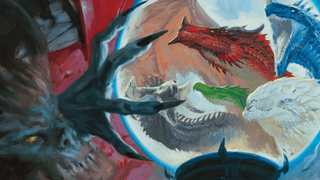
But Harvey, I hear you croon, like a little orphan boy in a snowy Dickensian street outside my rich and affluent manor, what's your take? Well, I say, beating this laboured framing device into the ground, I'm not sure things are looking great.
To be clear, I don't want D&D to perish, or anything. I'm a miserly old grump about it, but with the expectation that we'll be waiting years for another revamp, I can't help but wonder if rehashing the 2014 rules was a mistake. One of the things about this game is that the older rulebooks still exist; you can, right now, go grab rules for fourth edition, 3.5, second edition, heck, even AD&D—and have enough material to run a campaign for years. No one's stopping you. So there’s no need to trap the modern-day game in amber.
I also don't trust Wizards and Hasbro to not mess everything up, because it's just the way companies work right now. We've seen it time and time again—there is a point of critical mass where you start kicking down doors and doing things no one wants because you've run out of food to feed the shareholders. Inevitably, Wizards is going to start tearing up the furniture while going "is this anything???"
If D&D does go the way of the dodo, I predict that we'll get all feudal about it."
Staring into my crystal ball, I think one of two things are going to happen. The first scenario is that D&D just… ambles along in a boring way with some nasty bumps in the road for another decade, relatively unchallenged, before ultimately releasing a new edition at some point because it'll have to. After which all bets are off, but there's every chance that the world's biggest roleplaying game continues to survive and get fat off its incredible popularity.
The second is that the house of cards does collapse, in which case, I don't think anyone comes for D&D's throne, because it's World of Warcraft. By that, I mean that D&D, as an entity, has taken advantage of a very specific cultural moment, in time. Especially when it comes to fifth edition's popularity—something it took by riding the wave of a boom in TTRPG gaming overall. The soil just isn't fertile enough for a new one to grow in its place, it's already been used up, it's done.
If WoW vanished tomorrow, there'd be more players in other MMOs, sure, but a new titan wouldn't just slot into its place. People make new TTRPG systems all the time, yes, but none of them would have the historical staying power or structural, corporate and institutional might of D&D. If D&D self-immolated tomorrow, people would stick around to mourn and, given the effort of learning a new system, might just stop rolling dice entirely. I think they'd be wrong for doing so, but they would.
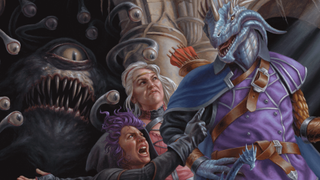
No. If D&D does go the way of the dodo, I predict that we'll get all feudal about it. You'll have three clans of survivors—players who use the old books (because Hasbro literally can't stop them), players who move onto D&D-likes such as Pathfinder 2e (which I wouldn't be that upset about), and players who start their journey through the dozens of other great, vibe-specific systems out there.
And honestly, maybe that's all good and fine. I welcome a post-apocalyptic age of TTRPG nomads. I've adored my journeys through Lancer, Masks, Blades in the Dark, ICON, Dread, and Pathfinder 2e to name a few. No king rules forever, and there might not always be one to replace it, but even in a fractured world we'll still have pen and paper. Or rocks and cave walls, depending on how bad things get outside of the Forgotten Realms.

 1 day ago
4
1 day ago
4
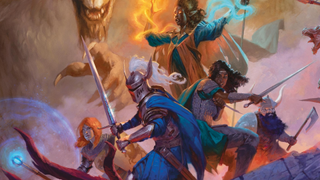


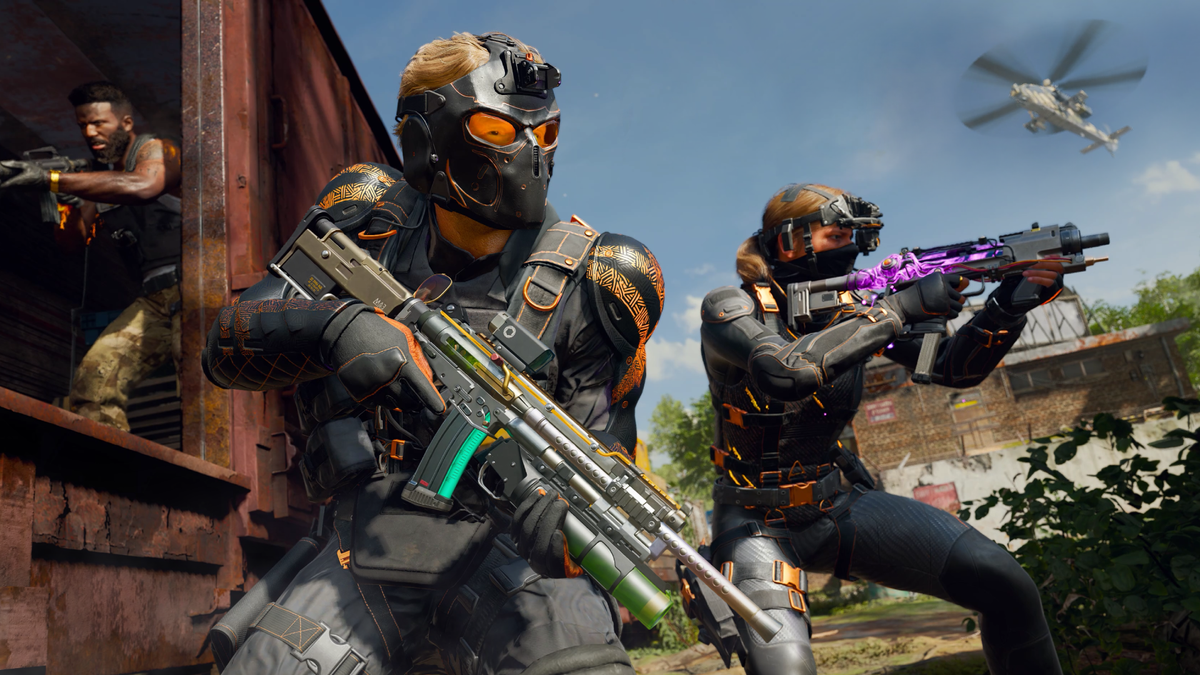





 English (US) ·
English (US) ·